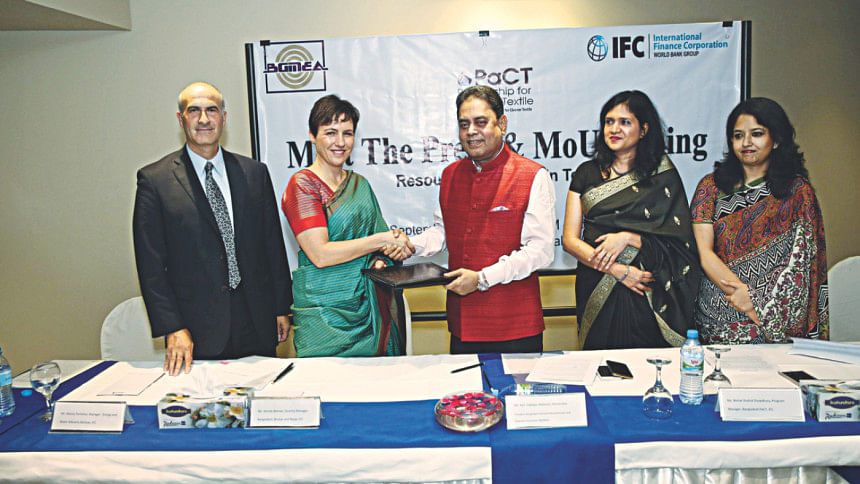BGMEA signs pact for green production

The International Finance Corporation yesterday signed an agreement with the Bangladesh Garment Manufacturers and Exporters Association to implement the second Partnership for Cleaner Textile (PaCT) in the garment and textile sector.
Under the PaCT programme, which was launched in 2013, garment and textile makers are advised to adopt modern technologies in factories and changing attitudes to reduce water and energy consumption in the next four years.
Wendy Jo Werner, IFC's country manager, and Siddiqur Rahman, BGMEA's president, signed the agreement on behalf of their respective sides at the Radisson Hotel in Dhaka to implement the PaCT in 250 spinning, dyeing and finishing units.
The IFC will spend $7 million for implementing the second phase of the programme. The first one was implemented in 215 factories at a cost of $11 million.
“The factories have reduced their water consumption significantly thanks to the implementation of the first phase of the PaCT,” said Rahman.
The PaCT is the largest textile-based resource efficiency programme in the world, said Alexios Pantelias, manager of energy and water advisory services of the IFC, the World Bank Group's arm that lends to the private sector.
“When the factories and brands commit to such a programme, it shows that they have a vision to move beyond the identity of being the world's second largest apparel exporter.”
Despite having one of the lowest per capita carbon dioxide emissions, Bangladesh has stepped up its efforts to be known for its environmental sustainability initiatives, Pantelias said.
“The Bangladesh textile sector deserves credit for accelerating green uptake.” At present, Bangladesh has 67 green garment factories, with 280 more on way, according to Rahman.
The PaCT showed that for every dollar invested in implementing their recommendations, 26 million cubic litres of water and 2 MWh of energy can be saved annually, and 23 million cubic litres of wastewater and 0.2 tonnes of carbon dioxide emission can be avoided per year, said Nishat Shahid Chowdhury, programme manager of the PaCT of the IFC.
The other benefits of the programme include better productivity, investment with higher return and cleaner environment for community, Chowdhury said.
As of now, groundwater level in Bangladesh is decreasing by 2.5 metre per year.
In its first phase, the PaCT helped save 21.6 billion litres of water, which is equivalent to average annual water use for 840,000 people in Bangladesh.
It also saved 2.5 million megawatt hours of energy per year, which is equivalent to 5.4 percent of total national grid output of Bangladesh in 2015– 2016, by working closely with more than 200 factories, Chowdhury said.
During the second phase, the IFC is targeting to save 32 million cubic litres of water annually and 3.8 million megawatt hours of electricity in 250 weaving, spinning, wet dyeing and finishing factories.
It aims to annually reduce greenhouse gas emissions by 701,588 tonnes, wastewater discharge by 28.8 million cubic litres and chemical use by 10,000 tonnes.
Under the PaCT's first phase, the 200 factories got back the $39.1 million they invested in just 10 months and, in turn, every year saved $16.3 million, Chowdhury said.

 For all latest news, follow The Daily Star's Google News channel.
For all latest news, follow The Daily Star's Google News channel. 



Comments